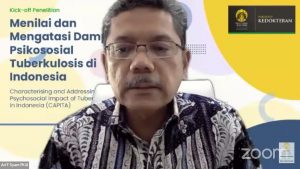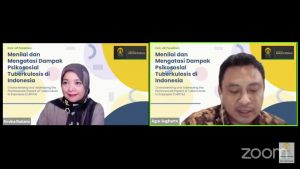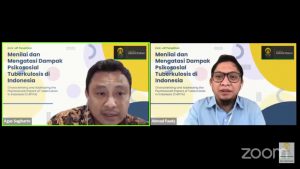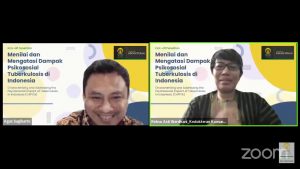Tuberculosis (TB) is the deadliest infectious disease in the world. Globally, the estimated TB cases are more than nine million cases with a decrease in morbidity and mortality, which is still lower than the target set. In the midst of the challenges of achieving TB elimination targets, efforts to prevent and treat TB are complicated by the stigma of TB in the community.
To examine the stigmatization of TB and its handling efforts, the Faculty of Medicine, Universitas Indonesia (FKUI) held a seminar with the theme “Assessing and Overcoming the Psychosocial Impact of Tuberculosis in Indonesia”, on Thursday (10/2). This virtual meeting discussed the Characterizing and Addressing the Psychosocial Impact of Tuberculosis in Indonesia (CAPITA) program, which was held by FKUI in February–November 2022.

The Dean of FKUI, Prof. dr. Ari Fahrial Syam, Sp.PD-KGEH, MBA, expressed his support for the research conducted by TB researchers. According to him, this research is very important because TB is a case that continues to increase. He emphasized the need for collaboration in research on a national and international scale so that the results can be published and become a policy brief for related institutions and the government.
“UI has collaborated with external parties, such as Oxford, Leiden University, Maastricht University, and Melbourne University, to open up opportunities for collaboration with other international institutions. This is done so that the quality of education and research will increase, so that it is beneficial for the community at home and abroad,” said Prof. Ari.
In addition to international collaboration, UI also collaborates nationally with the Indonesian Ministry of Health (Kemenkes RI). The Director of Infectious Disease Prevention and Control (P2PML) of the Indonesian Ministry of Health, dr. Siti Nadia Tarmizi, M.Epid., said that there are three directions from the President regarding the acceleration of TB elimination, namely aggressive tracking to find TB sufferers, TB drugs must be available and treatment is carried out thoroughly, and prevention must be carried out across sectors to the infrastructure side. .
In addition, efforts are made to reduce stigma and discrimination against patients, through the role of communities, partners, and multisectors. “Studies, studies, and research on TB are carried out in conjunction with the control program. The results are expected to be useful for strengthening the implementation, planning and evaluation of programs, said dr. Siti.

TB research is also carried out by the Indonesian Tuberculosis Research Network (Jetset TB Indonesia). Head of Jetset TB Indonesia Prof. dr. Rovina Ruslami, Sp.PD, PhD., said that there are ten priorities for TB research in Indonesia. These priorities include optimizing the early detection of TB cases, optimizing efforts to diagnose and treat drug-resistant TB, evaluation and intensification of contact investigations, strengthening efforts to find cases and treat TB in children, and develop TB prevention treatments.
Central and local government policies are also needed in TB control, in addition to optimizing TB diagnostic support laboratories, increasing patient compliance for treatment, developing TB diagnostic tools, and community empowerment efforts.

According to Ahmad Fuady, M.Sc., PhD. as the Head of the CAPITA Research Team, until now, there is no regulation that eliminates stigma against TB patients. Therefore, this study aims to provide scientific evidence to design and implement psychosocial interventions to reduce the negative stigma of TB.
According to Ahmad, the CAPITA study was carried out in seven provinces (West Sumatra, Jambi, Jakarta, Bali, West Kalimantan, South Sulawesi, and Maluku). The two main populations in this study included population A (770 adults undergoing TB treatment) and population B (640 working adults).
“Furthermore, a desk review was conducted on regulations related to TB stigma and discrimination and in-depth interviews. The results of the study and policy recommendations are then given to the Ministry of Health and the Ministry of Manpower and Transmigration as input for policy making,” said Ahmad.

According to Dr. dr. Retno Asti Werdhani, M. Epid. as Head of the Department of Community Medicine FKUI, stigma can be caused by four things, namely ignorance of the disease and its development, prolonged conditions (pandemic), lack of psychosocial support, and inadequate or inconsistent response from authorities. This can be addressed through the delivery of appropriate information to communities and individuals.
Another thing that should be considered is providing hope and positive stories to increase the patient’s chances of recovery. “Given the lack of understanding is a factor that triggers the formation of social stigma, health workers must be able to educate the public to get the right information,” said Dr. Retno.
Professor of Occupational Medicine FKUI Prof. dr. Muchtaruddin Mansyur, MS, Sp.Ok, PhD., said TB patients are stigmatized because they are associated with limited work outcomes. Stigmatization also creates a double burden on health workers as they have to deal with the increasing morbidity and mortality themselves and take responsibility for addressing TB as a public health problem. Therefore, efforts should be made to eliminate stigma by providing health education about TB, conducting research for better management, supporting policies and health services in the workplace, and appropriate occupational medicine practices.
Writer: Sapuroh For more information refer to:



